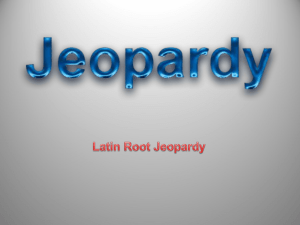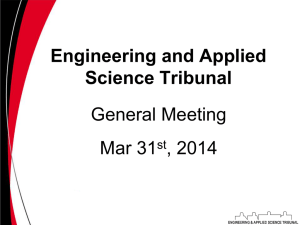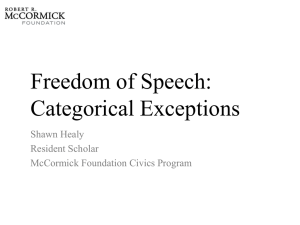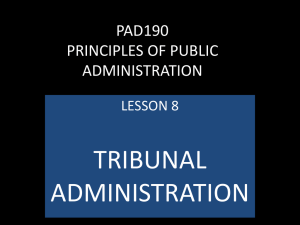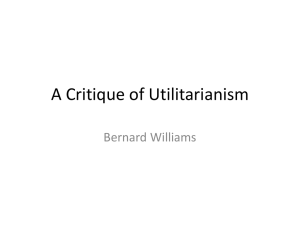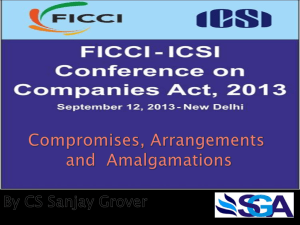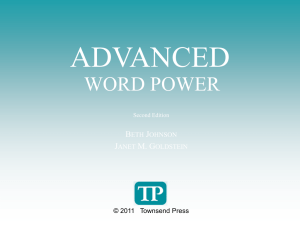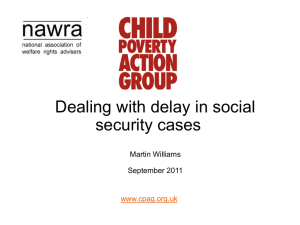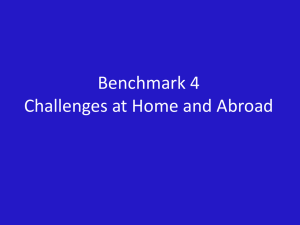PPt 12
advertisement
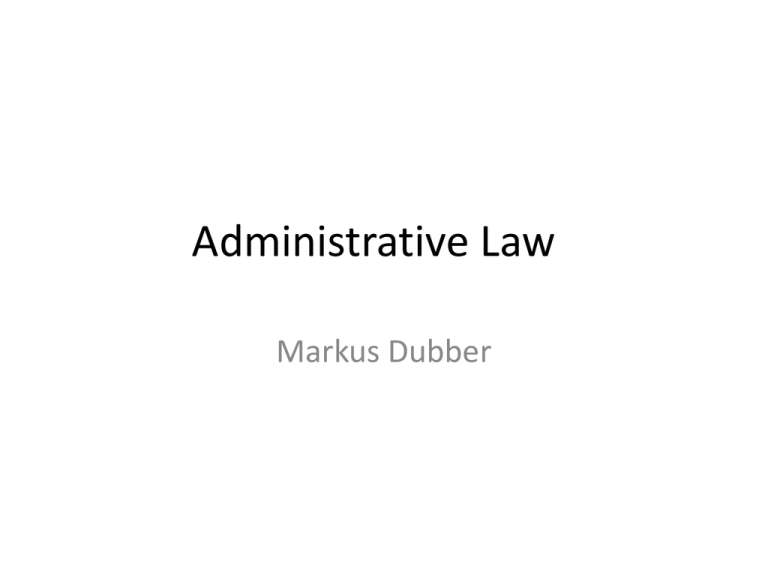
Administrative Law Markus Dubber David Dunsmuir v. Her Majesty the Queen in Right of the Province of New Brunswick as represented by Board of Management [2008] 1 S.C.R. 190 • “legal officer” fired with four months’ pay in lieu of notice; no reasons; no hearing; no opportunity to present/contest evidence • “substance” [jurisdiction?] – “Whether the combined effect of s. 97(2.1) and s. 100.1 of the PSLRA [Public Service Labour Relations Act] permits [a labour] adjudicator to inquire into the employer's reason for dismissing an employee with notice or pay in lieu of notice” • “process” – Procedural fairness, due process, natural justice … (no hearing etc etc etc) Take 1: Adjudicator • Substance – “preliminary” (jurisdiction?) • Yes, I may inquire into the “real” reason for the dismissal (cause vs. notice/pay in lieu) – “merits” • For cause? Not for cause? Unclear…but no matter because… • Process: – Dunsmuir was entitled to procedural fairness, and didn’t get it, therefore… – result: firing void • Reinstatement • Alternative: 8 months’ notice if overturned • Who’s disrespecting whom? – Administrator vs. administrator Take 2: Court of Queen’s Bench • Substance: – Statutory interpretation (of PSLRA) – Which standard (how much deference/respect)? • Which standard to determine standard? – Pragmatic and functional! • Pragmatic and functional in action – – – – Full privative clause Adjudicator’s expertise re: PSLRA Statutory purpose Nature of question (stat interpretation! Law, law, law) • Therefore: correctness – Correctness applied • Sorry, incorrect (no jurisdiction to inquire into cause) – “Ordinary rules of contract” govern (see Civil Service Act s. 20) » contract provides for termination with cause, reasonable notice or with pay in lieu of reasonable notice » employer elected to fire with pay in lieu of reasonable notice » only issue (reasonable) length of notice period Queen’s Bench cont’d • Process: Procedural fairness? – Got it, by virtue of the hearing before adjudicator! • Remedy: – Which standard(s?) • Patent unreasonableness for factual questions • Reasonableness simpliciter for mixed law/fact – Reinstatement improper because not authorized by PSLRA to make appointments – Failure to consider alternative remedy (short of reinstatement) » But provisional alternative remedy: 8 months’ notice • Result: 8 months’ notice upheld Take 3: Court of Appeal • Trial judge used wrong standard!!! – Reasonableness simpliciter, not correctess – Standard for standard • Pragmatic and functional (correct standard standard!) – Full privative clause – Adjudicator’s expertise re: PSLRA – Statutory purpose – Nature of question (stat interpretation! Law, law, law) – Exception • “correctness” review of “interpretation and application of caselaw” • Reasonableness simpliciter applied – Unreasonable interpretation of PSLRA • Reasons? See trial court • Procedural fairness – En passant: grievance procedure is plenty of proc. fair. • Disrespectometer: – (app.) court disrespecting (trial) court disrespecting administrator disrespecting administrator(s) – Direct: (app.) court disrespecting administrator • But less disrespectful than trial court? – More respect: choice of standard (reasonableness simpliciter) – Less respect: application of standard (unreasonable vs. incorrect) Take 4: SCC!! Bastarache and LeBel, JJ. 1. Substance At issue, firstly is the approach to be taken in the judicial review of a decision of a particular adjudicative tribunal which was seized of a grievance filed by the appellant after his employment was terminated. This appeal gives us the opportunity to re-examine the foundations of judicial review and the standards of review applicable in various situations. 2. Process: The second issue involves examining whether the appellant who held an office "at pleasure" in the civil service of New Brunswick, had the right to procedural fairness in the employer's decision to terminate him. 3. And All of the Rest of It: The two types of judicial review, on the merits and on the process, are therefore engaged in this case. Our review of the system will therefore be comprehensive, which is preferable since a holistic approach is needed when considering fundamental principles. Brave New World/Tabula Rasa?: From the Ground Up • Why judicial review at all? – 1. Rule of Law! • The function of judicial review is therefore to ensure the legality, the reasonableness and the fairness of the administrative process and its outcomes. – 2. But also: “In addition to the role judicial review plays in upholding the rule of law, it also performs an important constitutional function in maintaining legislative supremacy.”!?? • “legislative supremacy is affirmed and the court-centric conception of the rule of law is reined in [by the courts!?] by acknowledging that the courts do not have a monopoly on deciding all questions of law“ – In essence, [1] the rule of law is maintained because the courts have the last word on jurisdiction, and [2] legislative supremacy is assured because determining the applicable standard of review is accomplished by establishing legislative intent. And then there were two (?) • From formalism to pragmatism and functionalism, or From Two to Two (other, more pragmatic functional, i.e., better ones) – Formalism: Jurisdiction (The Dark Ages) • Preliminary question doctrine – Did the agency act within its jurisdiction? » If so, deference (intra vires) » If not, ultra vires!!!: no deference • Illegal, unauthorized, beyond the pale, without basis … – Law of corporations: ultra vires (corporate charter); “repugnancy” of charter with common law, law of nations, public welfare (constitution…) » Delegated (royal) jurisdiction – Police » Macro householder’s delegation of limited powers to micro householder (overseer, official, delegate, minister, etc.) – End the hypocrisy: Pragmatic and functional (The Enlightenment) • Two standards of review (Enlightenment I) – Correctness » Formerly known as ultra vires – Patent unreasonableness (CUPE 1979) » Formerly known as intra vires (or, rather, as not ultra vires) Three are better than two (the more the merrier) • Southam (1997) (Iacobucci) (Yet more light: Enlightenment II) – More nuance, more pragmatism/functionalism: • We need a third standard of review: – Reasonableness simpliciter (just plain ole reasonable, reasonable, period, reasonable, no ice, reasonable straight up etc) • Fits snuggly in between correctness and patent unreasonableness – Shouldn’t it be incorrectness, unreasonableness, and patent unreasonableness? Too negative, perhaps • “not supported by any reasons that can stand up to a somewhat probing examination” – Immediacy or obviousness of error Trouble in Paradise • What’s the difference? Too much nuance? – Trouble in the “lower courts”! • What’s unreasonable? What’s patently unreasonable? What, for that matter, is patently (anything)? – Is unreasonable ever OK? Even if it’s not patently so? • Too much of a good thing: deference to the point of accepting unreasonable decisions? Iacobucci to the rescue! • Ryan (2003): Setting things straight, once and for all [A] patently unreasonable defect, once identified, can be explained simply and easily, leaving no real possibility of doubting that the decision is defective. A patently unreasonable decision has been described as "clearly irrational" or "evidently not in accordance with reason". ... A decision that is patently unreasonable is so flawed that no amount of curial deference can justify letting it stand. A decision may be unreasonable without being patently unreasonable when the defect in the decision is less obvious and might only be discovered after "significant searching or testing" (Southam, supra, at para. 57). Explaining the defect may require a detailed exposition to show that there are no lines of reasoning supporting the decision which could reasonably lead that tribunal to reach the decision it did. Harsh words • David Mullan, in "Recent Developments in Standard of Review", in Canadian Bar Association (Ontario), Taking the Tribunal to Court: A Practical Guide for Administrative Law Practitioners (2000) [!]: [T]o maintain a position that it is only the "clearly irrational" that will cross the threshold of patent unreasonableness while irrationality simpliciter will not is to make a nonsense of the law. Attaching the adjective "clearly" to irrational is surely a tautology. Like "uniqueness", irrationality either exists or it does not. There cannot be shades of irrationality. This will not stand! - LeBel in Toronto v. CUPE 2003 … Enlightenment III, or LeBel has his way • Dunsmuir (2008): The Advent of Holism, The Irrelevance of Labels! – From “pragmatic and functional” to holistic approach – From “pragmatic and functional analysis” to “standard of review analysis” • Two are better than three, after all – But not the old two! That would be taking “a step backwards … and revert to pre-Southam law” – No, onward and upward: • Henceforth, it shall be – Reasonableness simpliciter simpliciter (i.e., without the simpliciter) – Correctness Reasonableness: The Answer, or More Questions? • What does this revised reasonableness standard mean? most widely used and yet most complex Reasonableness is one of the legal concepts. In any area of the law we turn our attention to, we find ourselves dealing with the reasonable, reasonableness or rationality. But what is a reasonable decision? How are reviewing courts to identify an unreasonable decision in the context of administrative law and, especially, of judicial review? [Good Questions, All!] • Who knows? Here is what it doesn’t mean: – The move towards a single reasonableness standard does not pave the way for a more intrusive review by courts and does not represent a return to pre-Southam formalism. … What does deference mean in this context? Deference is both an attitude of the court and a requirement of the law of judicial review. … [D]eference imports respect for the decision-making process of adjudicative bodies with regard to both the facts and the law. … Deference in the context of the reasonableness standard therefore implies that courts will give due consideration [!!] to the determinations of decision makers. Standard standard: Same old, same old 1. Privative 2. Purpose of tribunal in light of act 3. Nature of question – Law vs. fact – If law: "central importance to the legal system”? “outside specialized area of expertise”? – Constitutional question re: separation of powers – “true jurisdiction” 4. Expertise Including expertise in interpreting home statute Standard standard applied 1. Privative – Yes! (“every order is final”) 2. Purpose of tribunal in light of act – “time- and cost-effective”; better than courts—replaced courts 3. Nature of question – “The nature of the legal question is not one that is of central importance to the legal system and outside the specialized expertise of the adjudicator.” Done. 4. Expertise – Yes, and lots of it (Gold Standard: Labour!) • • Interpreting collective agreements, keeping the industrial peace, harmony Therefore: reasonableness Standard applied • Was the Adjudicator’s Interpretation Unreasonable? – Yes • “deeply flawed,” “fatally flawed,” no “reasonable interpretation” supports “remov[ing] the employer’s right under contract law” to fire with notice or pay in lieu thereof – But not patently unreasonable? What’s the difference? – Context, context, context (Willis, Willis, Willis) • Unionized employees vs. non-unionized employees – The former are covered by collective agreement, the latter aren’t; instead, they’re subject to ordinary rules of contract, which give employer the right fire an employee (a) for cause, (b) with notice, or (c) with pay in lieu of notice – Non-unionized employees also may file grievance, but only within the framework of their contractual employment relationship; in this case, Dunsmuir could challenge the reasonableness [!] of the notice he received for purposes of the calculation of “pay in lieu of notice” under option (c) » again, assessing the reasonableness of reasonableness assessments The Concurrers: Binnie • Not holistic enough – Not just tribunals: minister, board, public servant, commission, elected council, etc etc etc • Basic constraints (preliminary, procedural?) 1. Section 96, Constitution Act 1867 • “obvious” 2. “True jurisdiction”? • “simple”: “no one can exercise a power they do not possess” • Deference for, and only for, interpretation and application of home statute (and closely related statutes…) 3. Fair procedure = handmaiden of justice • • “obvious” But, administrators want to be fair too! “They share a belief in the rule of law.” Binnie 2 • Next: Outcome (substance) – Standard standard • Reasonableness standard presumption (presumption 1) – An applicant urging the non-deferential "correctness" standard should be required to demonstrate that the decision under review rests on an error in the determination of a legal issue not confided (or which constitutionally could not be confided) to the administrative decision maker to decide, whether in relation to jurisdiction or the general law. – Privative clause: Laskin, CJ: “What's wrong with these people [the judges], can't they read?” » Its existence should presumptively foreclose judicial review on the basis of outcome on substantive grounds unless the applicant can show that the clause, properly interpreted, permits it or there is some legal reason why it cannot be given effect. – Standard • Reasonableness presumption (presumption 2) – Not only reasonableness requirement is presumed (as opposed to correctness) but also its satisfaction: » “It should also be presumed, in accordance with the ordinary rules of litigation, that the decision under review is reasonable until the applicant shows otherwise.“ • Reasonableness, “properly interpreted” – Deference to official (minister vs. ministerial delegate (Baker)) plus deference to official’s exercise of discretion Binnie 3 • What’s changed? Not so much… • Then: Deference debate framed as choice among standards (i.e., standard standard) • Now: Deference debate framed as choice within standard (i.e., standard) • The result of today's decision may be like the bold innovations of a traffic engineer that in the end do no more than shift rush hour congestion from one road intersection to another without any overall saving to motorists in time or expense. – Redeployment of Disrespectometer • Standard standard applied – Reasonableness (“home turf”) • Standard applied – Unreasonable (“he stretched the law too far”) The Concurrers: Deschamps • Let’s get formalist! • What’s the big deal? This is easy! – Law (no deference; correctness) vs. fact/law and fact (deference; reasonableness) – Just like appellate review of lower court • Who is (dis)respecting whom? – App ct vs. “inferior,” ”lower” court = (app/inferior?) ct vs. administrator – “reasonableness” no problem in other areas of law, so what’s the problem here? • Standard standard applied: correctness – Common law issue, not interpretation of enabling statute • Standard applied: incorrect – Context, context, context! Interpretation “in vacuum”! – Same result if reasonableness standard! Next: Procedural Fairness • History of Procedural Fairness – Nicholson (79) • Gloss (simple application of Ridge v. Baldwin): – master-servant (contractual!) – offices » held at pleasure » “offices where there must be cause for dismissal” (Nicholson) • “less rigid approach to natural justice” … – Knight v. Indian Head School Division (1990) (L'Heureux-Dubé, J.) • Dismissal of director of education w/ contractual notice – Procedural fairness? Yes: “strong statutory flavour” • Public vs. private law – State as private law party (Dicey?) • the Crown = ordinary citizen, contracting with other ordinary citizens for employment; no special protections for those ordinary citizens beyond private law remedies under law of contract; no reinstatement – But public law remedy isn’t (permanent) reinstatement, only requirement of termination under certain procedure (e.g., Nicholson) – Abandon distinction between contractual employees and office holder • All employees are contractual – With some exceptions: judges!, ministers of the Crown, “others who fulfill constitutionally defined state roles” In Dunsmuir’s case… • Adjudicator erred in applying duty of fairness to Dunsmuir – But they changed the law, didn’t they? • Distinction b/w office holder and contractual employee “should be done away with” • “[T]o the extent that the majority decision in Knight ignored the important effect of a contract of employment, it should not be followed.” – Respect • Habeas corpus: contrary to law at the time of decision… • Adjudicator didn’t misapply the law, at the time – Less disrespect: no “correction” of “error” – More disrespect: overturn despite absence of error Canada (HRC) v. Canada (AG) [“Mowat”] [2011] 3 S.C.R. 471 • • • • LeBel (Dunsmuir) & Cromwell Fired, sexual harassment HR complaint HR Trib: 6 weeks $5k (max, incl. interest), plus $47k legal costs ($196k request) • Question: May HRC order payment of victim’s legal costs under s. 53(2) HR Act: “any expenses incurred by the victim as a result of the discriminatory practice”? Dunsmuir effect? • Answers: – HR Trib: yes; FC: yes Dunsmuir – FCA: no; SCC: no • Approaches on judicial review: – FC: “pragmatic & functional” • Reasonableness simpliciter/(simply) reasonable Dunsmuir – FCA: “standard of review analysis” • correctness/incorrect (but also unreasonable) – SCC: “standard of review analysis” • reasonableness/unreasonable How it’s done • Precedent re: HR Trib – Deference on facts, not on law (citing Mossop) – But: Dunsmuir changed things, “emphasis on deference”…so • “Standard of Review Analysis” – Differentiate among questions of law: no “sweeping them all under the standard of correctness” allowed! – Starting point: Deference, even on questions of law • Exc: Jurisdiction: not here • Exc: Central importance to legal system as a whole: not here • Exc: Outside area of expertise: not here – No “return to formalism”; costs “intextricably intertwined with mandate & expertise” to make fact finding re: discrimination – Therefore: deference, reasonableness The Standard Applied • Reasonable? – Driedger: text in context – Text: • Maxim: presumed intent to avoid superfluous language • Maxim: presumed intent to use word in technical sense (“costs” vs. expenses) – Context: • Legislative history (incl. unenacted provisions!): active commission vs. legal costs • Commission doesn’t think legal costs are an option (otherwise they wouldn’t have kept asking for them to be included in Act!) • “parallel” provincial legislation (not always helpful, but in this case…) – Purpose: • Can’t “supplant” textual/contextual analysis • Policy change: HRC stops taking cases in 2003…but no provision for costs…suggestion of “clinic-type assistance” not adopted – Text, Context, Purpose all point one way; only “dictionary meaning of ‘expenses” used by HR Trib points in the other • Verdict: Unreasonable, not just incorrect HR Tribunal’s Response Thank you very much for the deference! CICB: Ahmed, Ont. Sup. Ct. ‘08 • Facts: – Applicant: brain injury, cane, comprehension difficulty – Fights with parking enforcement officer; damages car with cane • Arrested & taken to station: charged with mischief, assault w/ weapon, possession of weapon… – prosecution stays charges… • Excessive force: handcuffed, kicked, head banged against road, … – Files complaint with police; rejected; no criminal charges vs. police – Files CICB application • CICB refuses to issue application – “In the absence of charges, it is assumed that the officers were acting in accordance with the commission of their duties.” – “The Board does not have sufficient credible evidence to establish that the arresting officers assaulted Mr. Ahmed, or that they were acting outside the boundaries of their law enforcement duties.” Compensation for Victims of Crime Act 5. Where any person is injured or killed by any act or omission in Ontario of any other person occurring in or resulting from, (a) the commission of a crime of violence constituting an offence against the Criminal Code (Canada), including poisoning, arson, criminal negligence and an offence under section 86 of that Act but not including an offence involving the use or operation of a motor vehicle other than assault by means of a motor vehicle; … the Board, on application therefore, may make an order that it, in its discretion exercised in accordance with this Act, considers proper for the payment of compensation to, (d) the victim; ... 8. [Where an application is made under s. 5,] "the chair of the Board shall refer the application" for a hearing. 16(1) An order for compensation may be made whether or not any person is prosecuted for or convicted of the offence giving rise to the injury or death …. Rules of Procedure (pursuant to the Statutory Procedure Act) 1.7 Refuse to Issue or Accept an Application The Board, in exercising its discretion, may refuse to issue an application for compensation or may refuse to accept an application for compensation under its Act, on the grounds that: the applicant has failed to raise any issue which is within the jurisdiction of the Board under the Act; the applicant has failed to disclose a claim under the Act; the Act does not apply to the subject matter raised in the application. An applicant who disagrees with the decision of the Board to issue or accept an application may ask the Board to review the application, in which case the chair, vice-chair, or appointed member of the Board shall decide whether to accept the application or refuse it. Tribunal Self-government: Statutory Procedure Act Control of process 25.0.1 A tribunal has the power to determine its own procedures and practices and may for that purpose, (a) make orders with respect to the procedures and practices that apply in any particular proceeding; and (b) establish rules under section 25.1. 25.1 (1) A tribunal may make rules governing the practice and procedure before it. Standard of review, or not… Although neither of the parties directly address the question of the standard of review [!!!] we note that in Dunsmuir v. New Brunswick, [2008] S.C.J. No. 9 the Supreme Court held that deference will usually apply to questions of discretion and to questions where the legal and factual issues are intertwined and cannot easily be separated [!!!]. However, in Gismondi v. Ontario (Human Rights Commission), [2003] O.J. No. 419 (Div. Ct.) this Court held that where a tribunal's decision is attacked on the basis of a denial of natural justice, it is not necessary for the Court to engage in an assessment of the standard of review [!!!]. Natural Justice? Procedural Fairness? In declining to provide an application form because no charges were brought against the police officers in relation to the incident, the Board ignores the specific provisions of s. 16(1) of the Act. [substance?] Further, in stating that the Board "does not have sufficient credible evidence to establish that the arresting officers assaulted Mr. Ahmed" the Board created for itself an evidentiary standard which does not exist in rule 1.7. That rule makes no reference to credible evidence but simply to the disclosure of a claim within the jurisdiction of the Board. [self-government?] By its somewhat baffling insistence on "credible evidence" the Board must be taken to have determined that the facts put before it by the applicant's counsel cannot be proved. Nowhere can I find authority in the enabling legislation or the rules for that degree of pre-judgment…. [pre-judice? bias?] It must also be noted that rule 1.8 and 1.8.1 of the Board's Rules of Procedure enabled the Board to dismiss an application without a hearing upon notice to the applicant who may make submissions opposing the intention to dismiss. The applicant's counsel concedes that power exists and may well be exercised in this case. I accept his submission however that the power to dismiss without a hearing can only be exercised after considering the application…. [what’s the point? efficiency?] Regrettably, what permeates this decision of the Board is the suggestion that police officers act within the scope of their authority when making arrests, and that therefore their conduct is to be considered in a manner differently than that which applies to other persons. It is to be noted that s. 5 of the Act commences with the phrase "where any person is killed or injured by any act or commission in Ontario of any other person ..." resulting from the commission of a crime of violence that constitutes an offence under the Code, the Board may order compensation. The phrase "other than a police officer" so as to modify "any other person" is nowhere to be found. [substance?] I therefore conclude that by prejudging the merits of the applicant's claim under the guise of its gate keeping function set out in rule 1.7(1) and refusing to issue an application, the Board has denied to the applicant procedural fairness. [substance in the guise of procedure? review of substance…?]
